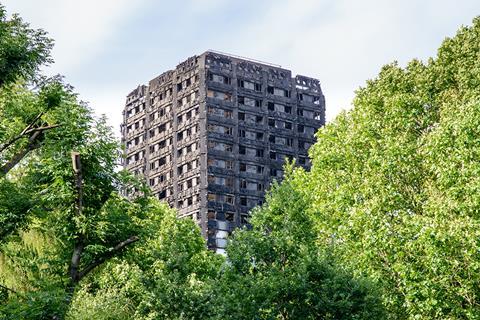Evidence session postponed until at least Wednesday as witnesses claim right not to incriminate themselves
The inquiry into the Grenfell Tower disaster is unlikely to hear any further evidence until the middle of next week, while it gets to grips with the request by a number of witnesses for assurances that evidence they give will not be used to prosecute them.

Inquiry chair Sir Martin Moore-Bick told the inquiry this afternoon that plans to hear evidence from witnesses on Monday and Tuesday would be put on hold as the request is determined.
His comments came this afternoon after lawyers representing bereaved survivors and relatives this morning set out their cases against the firms involved in the ill-fated 2014 refurbishment of Grenfell Tower, which coated the building in flammable material.
After a lawyer representing witnesses explained in detail their request for an undertaking from the Attorney General that their evidence not be used against them in any future criminal prosecution, Moore-Bick said: “We were going to hear from witnesses on Monday. Now we will hear submissions from the bereaved survivors and relatives about this application [instead].
“We won’t hear any inquiry evidence on Monday, or I suspect Tuesday. Whether the inquiry is delayed any further will likely depend upon the outcome of this application.”
The witnesses attempting to apply for this waiver on their evidence have threatened to refuse to answer inquiry questions, citing laws guaranteeing people’s right not to incriminate themselves.
Jonathan Laidlaw QC, setting out the details of the request on behalf of the witness, stressed that it was only individuals, not companies, that were seeking this waiver, and that they were not asking for immunity from prosecution. It was only, he said, an undertaking that evidence given to the inquiry not be used against them in any future prosecution.
Earlier today, QC Stephanie Barwise, representing a group of bereaved survivors and relatives of the tragedy, published evidence accusing some of the firms involved in the refurbishment, including fire engineer Exova, of “epidemic levels of incompetence”. Barwise said main contractor Rydon and cladding panel supplier Arconic were both aware of the risks of the refurbishment, despite their evidence to the contrary.
Barwise said “no formal advice was ever sought as to the requirements of Regulations governing the facade” by scheme architect Studio E, despite it being aware of the need to consider fire risk, and having “admitted ignorance” itself of the requirements of regulations.
She said Arconic, the manufacturer of the Reynobond cladding panel used, “made no effort to warn the relevant parties involved at Grenfell as to the patent unsuitability of its product”, despite having been aware “that its Reynobond PE products were unsuitable for buildings over 18m high”.
The Reynobond panels had been substituted for the originally specified zinc-coated panels to save money, Barwise’s evidence stated.
In evidence submitted earlier this week, all the main parties in the refurbishment denied responsibility for the blaze, with Arconic blaming the project team for specifying the wrong materials, and Rydon and Exova saying design responsibility lay with Studio E. Studio E itself said the panels used in the scheme were incorrectly marketed and that the meaning of building regulations guidance was unclear.










No comments yet